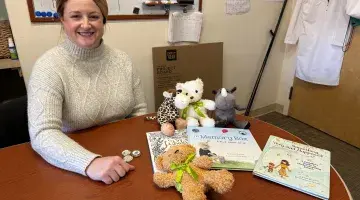South Shore Health Supports Survivors of Early Adulthood Loss
Author
Aubrie Hills, MA, LCSW, CT; Social Worker & Bereavement Coordinator
When you envision a grief support group, what do you see?
If you are like most people, you may picture a scene from a TV show or movie, with chairs arranged in a circle and older, widowed adults blowing their noses. Certainly, there is a kind of nuance to the placement of chairs and tissue boxes that many support groups share. However, we recognize that grief occurs in all ages and stages of life, and it is not just older adults that are in need of support after a loss.
As the bereavement coordinator for Hospice of the South Shore, I support those left behind when a hospice patient dies and help them to navigate life after a loss. I also coordinate our grief support groups, which are open to all—not just families of our patients. My goal is to create intentional support spaces without any fluff or pretense – for grievers of every age.
I often see men and women in their 20s and 30s who have experienced the death of a parent, spouse/partner, or sibling. These younger adults can have trouble relating to the experiences of their older counterparts.
Perhaps a young adult cared for an ailing parent while negotiating coursework, or even while parenting a young child. A 25-year-old has a much different experience when he or she loses a sibling than does a 65-year-old. While the pain of loss is universal, it’s always easier to feel supported when you know you are not the only one who can relate.
There are many resources for young adults enrolled in colleges and universities, and there are some excellent support groups in Boston for these grievers, too. But we have heard that it would be helpful to provide support specifically for this grieving population in our community, close to home.
This winter, we are pleased to offer a new grief support group tailored to survivors of early adulthood loss. This group will be comprised of grievers who are in their 20s and 30s. The group structure is similar to that of our other support groups, with the first two weeks being open to new members. Our hope is that members will be able to find hope and healing as they share about the unique challenges of grieving a significant loss so early in life.
For more information or to register, contact Aubrie Hills, Bereavement Coordinator, at 781-624-7046 or email ahills [at] southshorehealth.org (ahills[at]southshorehealth[dot]org).
Author
Aubrie Hills, MA, LCSW, CT; Social Worker & Bereavement Coordinator






